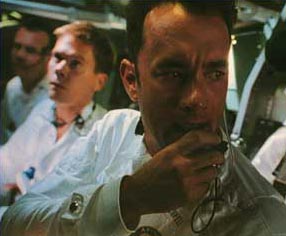
|
A-List: Celebrating AstronautsFebruary 18, 2003
Seeing as how I was born in 1969, I essentially missed the Space Race. It didn't keep me from emptying library after library of every book on the subject but two things slowly dawned on me. One: being terribly nearsighted was going to pretty much eliminate any chance of my ever leaving the Earth; and two: there weren't any more manned missions. Sure there was Apollo-Soyuz that I could remember but the Space Race was pretty much over. Then there was the announcement of the Space Shuttle program, which seemed to be an answer to both of the above problems. Here was a program that promised that there would be "Payload Specialists." These individuals would be non-astronauts, or perhaps even private citizens whose paychecks were being paid by the company that was having the satellite put into orbit or whose experiment needed tending. Thanks to more than understanding parents, I watched every glide test, I read everything that was available, I was even taken to the Johnson Space Center (mission control) which didn't exactly dissuade me from my dreams of space. Of course, the Space Shuttle program never lived up to the original premise, but I still followed the program during my junior high and high school years. It was quite a jarring experience when Challenger exploded, a sad feeling that would be revisited when Columbia came down in pieces instead of its routine glide. In an effort to think of happier times for our space program, I came up with the following list of movies that I feel have done justice to our manned space exploration. What struck me about this list is its brevity so any feedback would be appreciated.
2001I think I read the novelization before I actually saw the movie, but when I did see it, I was simply captivated. Since I was only around nine years of age or so, the ending didn't really matter to me as the rest of it just seemed so right. Here is a movie that was made before we actually landed on the moon, yet the science part of the science fiction is very good. Forecasting the future business economy turned out to be far trickier, but who can blame Kubrick for being on wrong on the fate of Pan Am. They were very much a viable organization at the time and had pioneered almost every long distance air travel to that point. Other samples of Kubrick's foresight include the space station being wheel shaped and slowly rotating to provide gravity, the completely functional and unaerodynamic (that's a word, right?) globish moon lander, and the oft-copied space train design of Discovery that not only looked good but had a practical reason: a long body that was good for keeping crew away from the nastiness of the engines.Sure there were some liberties and the "character" of HAL probably set back the acceptance of computers by a decade or so, but all in all 2001 is a movie that got generally got it right.
Apollo 13Sure it's all but a documentary, but there were still plenty of places that the film could have gone wrong. The movie also earns bonus points for using current special effects technology to create views that were simply impossible to have actual footage shown since there was no way to place cameras in those locations.
The Right StuffMy dad won serious bonus points for taking me to this one when it was initially released. Liberties are definitely taken with this film (there are no visual effects when one goes through the sound barrier), but the movie does an excellent job of capturing the pioneering efforts of both the test pilots at Edwards and of original Mercury 7. I've always had a bit of a pacing problem with the grand reception and fan dance sequence later in the film but all is forgiven by the time that the perfectly cast narrator closes the films with "and on that day Gordo Copper went higher, faster, and further than any human before him." Cue the glorious theme music, roll the credits. The Right Stuff indeed.
ArmageddonOn the majorly dishonorable but at the same time honorable mention for some brief scenes, I have Armageddon. The science pretty much only works in the framework of a summer blockbuster; however, similar to the way he convinced the Navy to assist with Top Gun and then going completely fictional, Jerry Bruckheimer was able to get NASA on board. Thanks to this involvement, some of the brief training scenes revived the wannabe NASA geek in me. These scenes included the water tank, the huge (and I never realized just how huge until I saw it in the film) vacuum chamber, the vehicle assembly building, and even the loading section of the tower where the astronauts enter the shuttle. I'm pretty darn sure that's all location shooting.
|
Monday, December 29, 2025
© 2006 Box Office Prophets, a division of One Of Us, Inc.